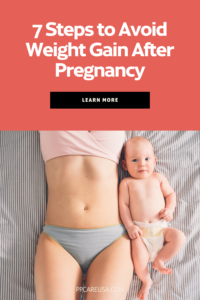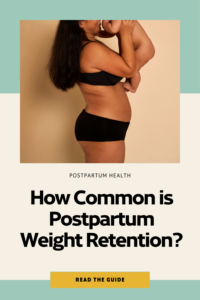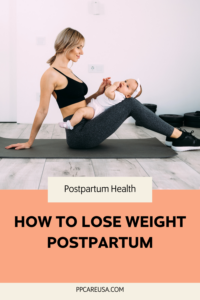Welcoming a baby into the world is a life-changing experience, but for many mothers, postpartum weight gain and retention can greatly impact a new mom’s confidence and day to day life.
This issue is far more complex than simply “eating less and moving more.” From hormonal changes to lack of sleep and inadequate nutrition, there are a number of causes associated with gaining weight after pregnancy.
In fact, a recent study conducted by the National Institute of Child Health and Human Development (NICHD) noted a multitude of elements contributing to postpartum weight gain and retention, particularly for low-income women (NICHD).
How Common is Postpartum Weight Retention
Postpartum weight retention refers to the weight a mother retains after giving birth compared to her pre-pregnancy weight. According to the NICHD study, nearly 75% of women were heavier one year postpartum than they were before pregnancy. Among the participants:
- The average pre-pregnancy weight was 161.5 lbs (BMI 27.7 kg/m²).
- Women gained an average of 32 lbs during pregnancy.
- At one year postpartum, the average weight was 172.6 lbs (BMI 29.4 kg/m²).
Of particular concern, 47.4% of women retained over 10 lbs, and 24.2% retained over 20 lbs. These figures highlight the widespread nature of postpartum weight retention and its role in increasing obesity risk, even among women who started pregnancy at a healthy weight.
Risk Factors for Postpartum Weight Retention
The NICHD study identified several risk factors, many of which are interconnected and influenced by broader social determinants of health. These include:
1. Pre-Pregnancy BMI and Excessive Gestational Weight Gain
Women with higher pre-pregnancy BMI were more likely to retain weight postpartum, particularly if they gained more than the recommended weight during pregnancy. Excessive weight gain can be challenging to shed, especially without targeted postpartum support.
2. Socioeconomic and Racial Disparities
Women from low-income backgrounds, younger mothers, and those on public insurance were disproportionately affected by weight retention. African American women, in particular, were more likely to retain significant weight. These disparities are often linked to limited access to postpartum care, nutritious food, and opportunities for physical activity.
3. Breastfeeding
Breastfeeding at six months postpartum was associated with lower weight retention. Lactation burns additional calories and helps regulate hormones, both of which can support gradual weight loss.
4. Physical Activity
Moderate exercise was another protective factor. However, the demands of new motherhood, including time constraints and fatigue, often make regular physical activity difficult to maintain.
Beyond Diet and Exercise: What No One Tells You About Postpartum Weight Retention
While diet and exercise are commonly emphasized when you talk to your PCP or OBGYN about your weight gain after pregnancy, they are only part of the picture.
Postpartum weight retention is also heavily influenced by physiological, psychological, and lifestyle factors. Here are some truths every mother should know:
1. Hormonal Changes
During pregnancy, your body undergoes significant hormonal shifts to support the baby. After childbirth, it can take months—or longer—for these hormones to stabilize.
Elevated cortisol levels (the stress hormone) and fluctuations in insulin sensitivity can promote fat storage and make weight loss more difficult.
The best way to determine if hormone fluctuations could be the cause of your weight issues after pregnancy is to get personalized lab work done, based off of your health history and other symptoms. At PPCU, we specialize in getting to the root cause of your postpartum symptoms. Schedule an appointment with one of our health practitioners today to see if we can help!
2. Sleep Deprivation
New mothers often experience fragmented sleep due to nighttime feedings and infant care.
Sleep deprivation disrupts metabolism and increases the production of ghrelin, a hormone that stimulates hunger, while reducing leptin, the hormone that signals fullness. This combination can lead to overeating and hinder weight loss.
Not to mention, mamas sometimes use late night snacking as a coping mechanism if they are feeling tired, overwhelmed, anxious or depressed. Those extra calories can add up over time!
3. Nutrient Depletion and Thyroid Issues
Pregnancy and childbirth deplete vital nutrients like iron, zinc, and vitamin D. This nutrient depletion can slow metabolism and contribute to thyroid dysfunction, including postpartum thyroiditis, which affects up to 10% of women. An underactive thyroid can cause fatigue, weight gain, and other symptoms.
For a list of postpartum labs we typically recommend, check out our recent blog post.
4. Mental Health Challenges
Postpartum anxiety and depression can significantly impact weight regulation. Emotional eating or lack of appetite, coupled with the stress of adjusting to motherhood, can disrupt healthy habits.
Seeking mental health support is crucial for both emotional well-being and physical health.
5. Societal Pressure and Misconceptions
Society often glorifies “bouncing back” after childbirth, creating unrealistic expectations for new mothers. This pressure can lead to unhealthy dieting practices that are unsustainable and counterproductive.
How to Lose Weight Postpartum
Although postpartum weight gain and retention can feel overwhelming, there are actionable steps mothers can take to support their recovery and overall health:
1. Prioritize Holistic Health
Instead of focusing solely on weight loss, prioritize overall well-being. This includes nourishing your body with whole foods, staying hydrated, and addressing nutrient deficiencies through supplementation when needed.
2. Support Hormonal Balance
Work with a healthcare provider to monitor hormonal health, including thyroid function. Blood tests can identify underlying imbalances that may be contributing to weight retention.
3. Emphasize Sleep Hygiene
While uninterrupted sleep may be unrealistic with a newborn, aim to maximize rest whenever possible. Share nighttime responsibilities with a partner or caregiver, and create a calming bedtime routine.
Our new book, “What is Mommy Doing?” can help you explain to your family why you need to prioritize sleep and other important routines in this vital time after pregnancy.
4. Seek Social Support
Join postpartum support groups or connect with other mothers who understand the challenges you’re facing. Shared experiences can reduce feelings of isolation and provide motivation to adopt healthy habits.
I am a part of a moms book club that meets monthly and it is something I always look forward to!
5. Incorporate Gentle Movement
Start with low-impact activities like walking, yoga, or postpartum Pilates. Even 15-20 minutes of movement a day can improve mood and energy levels while supporting gradual weight loss.
6. Breastfeed if Possible
If breastfeeding is an option for you, it can aid in postpartum weight loss while providing essential nutrients to your baby. Remember, every mother’s journey with breastfeeding is different, and any amount is beneficial.
7. Manage Stress
Chronic stress can hinder weight loss and overall recovery. Incorporate stress-reducing practices like mindfulness, deep breathing, or engaging in hobbies you enjoy.
How to Talk to Your Health Care Team About Weight Gain After Pregnancy
Healthcare providers play a critical role in addressing postpartum weight retention. However, as the NICHD study suggests, typical postpartum care often overlooks these concerns.
That’s why at PPCU, we offer comprehensive postpartum care that includes:
- Nutritional and metabolic panels
- Thyroid function tests
- Mental health screenings
Patience and Self-Compassion
Perhaps the most important truth about postpartum weight retention is that recovery takes time. It’s easy to feel frustrated or compare yourself to others, but every body is unique. Give yourself grace and celebrate small victories along the way.
Postpartum Weight Gain Doesn’t Have to Be Your Reality
Postpartum weight retention is a multifaceted issue influenced by physical, emotional, and societal factors. Addressing disparities and providing personalized care is essential for supporting mothers during this critical period.
By prioritizing holistic health, seeking support, and understanding the underlying causes, new mothers can navigate their postpartum journey with confidence and resilience.
Remember, your postpartum body is strong, capable, and worthy of care—and so are you.



Postnatal Depletion
Meet the Team
Our Services
Supplements
A virtual healthcare clinic that helps postpartum mamas recover from postnatal depletion syndrome with a holistic approach.

Get in touch